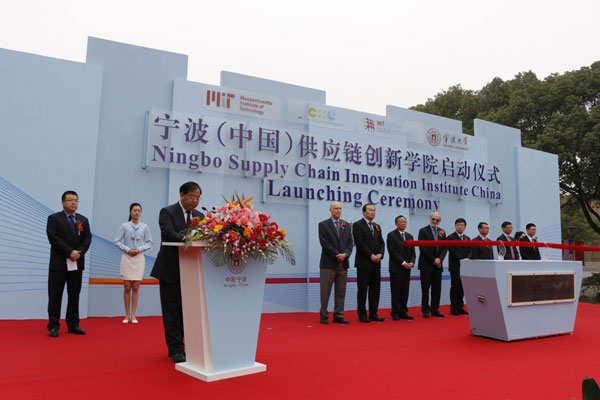Supply-chain innovation institute to be set up in Ningbo
Updated: 2016-03-14 20:23
By Chen Qide(chinadaily.com.cn)
|
|||||||||
 |
|
The launching ceremony of Ningbo Supply Chain Innovation Institute China is held in Ningbo, East China's Zhejiang province.[Photo provided to chinadaily.com.cn] |
China's first supply chain innovation institute was launched in Ningbo, Zhejiang province.
"The school is aimed at providing high quality talent in supply chain management for the Chinese market,"said Yossi Sheffi, director of the Transportation and Logistics Center of Massachusetts Institute of Technology (MIT).
The institute is a joint venture launched by Ningbo University and MIT to give high-end training to senior managers.
Sheffi said the institute, an independent non-profit education and research institution, will also offer Master's and doctoral programs.
Insiders said supply chain management, considered one of the four major strategic resources in the 21st century, has become an important means to help enterprises reach high-efficiency and low-cost operation.
China is expected to call for one million talents in supply chain management to meet domestic market needs, insiders said.
"It is not only China that needs such talent, but the world," Sheffi said.
He told chinadaily.com.cn that it is often the case that an MIT graduate majoring in supply chain management can get four or five offers from enterprises.
"That's why some big companies, such as Wal-Mart, Starbucks and Siemens, were very excited when they heard that MIT would join hands with Ningbo University to establish China's first supply chain management institute, for they will find it possible to employ high-end talents for their subsidiaries in China in the near future," he said, adding that effort to reinforce supply chain management is able to reduce costs in production.
Sheffi said in developed countries, costs of logistics and supply chain management account only for seven to eight percent of a product price, while costs in China in this field are expected to take more than 20 percent.
"If we reduce costs in logistics, prices for the products made in China are expected to go down by 15 percent, making a great impact on China's development and the competitiveness of its enterprises," he said.
Sheffi said the institute will adopt MIT's curriculum, teaching methods and evaluation system to cultivate high-level and international talent in supply chain management.
His words were echoed by Zhang Minghua, vice mayor of Ningbo, who said the institute will try to establish an industry alliance mechanism with enterprises from Ningbo and other parts of the country in order to develop international production-study-research cooperation.
"Launching such a project will enable us to attract more global well-known logistics service suppliers as well as manufacturing, retail and service companies, providing a favorable environment for them to develop business in Ningbo," Zhang said, adding that the city aims to set up a world-class logistics cluster by upgrading its port.
Sheffi said the institute plans to enroll its first full-time students from around the world for a Master's degree in autumn next year. The full-time Master's program lasts 10 months including one month of study at MIT, while the full-time PhD program takes three years with one to two semesters at MIT.
He said the institute generally does not recruit graduates of colleges and universities. Candidates are required to have good comprehensive quality and three to five years of work experience with the background of supply chain management or other related disciplines, such as information technology and economics.
Related Stories
Japanese shipping company to pay $8m compensation to Ningbo 2015-12-22 19:26
Ningbo to host two key trade summits 2015-12-01 10:33
Ningbo, Zhoushan ports complete merger 2015-09-30 09:07
Ningbo seeks advice from foreign experts on development 2015-09-21 10:49
Ningbo, Zhoushan ports plan integration 2015-08-27 11:14
Ningbo seeks to deepen ties with Central, Eastern Europe 2015-05-15 16:57
Today's Top News
German voters batter Merkel over migrant policy
China condemns terrorist attack in Turkey
Growth focus
Opening a window on rural China
Experts confident in growth objective
Clinton, Sanders spar over immigration
Scholar praises pragmatic government work report
China hits back at US over ZTE restrictions
Hot Topics
Lunar probe , China growth forecasts, Emission rules get tougher, China seen through 'colored lens', International board,
Editor's Picks

|

|

|

|

|

|






